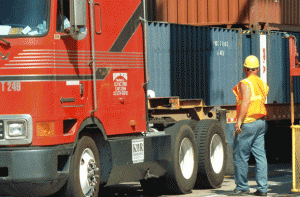 Dockworkers from 29 ports on the West Coast have voted to ratify a tentative agreement by an overwhelming majority for a new contract of five years with shipping companies that was reached back in February, said union leaders late last week.
Dockworkers from 29 ports on the West Coast have voted to ratify a tentative agreement by an overwhelming majority for a new contract of five years with shipping companies that was reached back in February, said union leaders late last week.
The workers voted 82% in favor of the new contract, which will be retroactive back to July of last year and expires on July 1, 2019.
The vote ends formally, a drawn out labor dispute, which caused a very big backup in imports as well as exports at ports up and down the west coast.
The union said the agreement provided 20,000 jobs that are very good paying at the ports on the West Coast. The union also the contract would maintain great health benefits, improve overall benefits, pensions, limit the outsourcing of work and provide an improved system for job dispute resolving.
The CEO and President of Pacific Maritime Association Jim McKeena, which is the shipping company representatives, said the new contract provides an important framework for hard work that lies ahead to help overcome the competitive challenges and continue to keep the ports on the West Coast as the destinations of choice for worldwide shippers.
McKenna added that from Bellingham, Washington south to San Diego the ports have been for many years the primary gateways for cargo that leaves as well as comes into the U.S. and have interests aligned to ensure they can efficiently and effectively handle capacity and growth that drives both jobs and economies.
PMA members voted to approve the contract Wednesday. Officials at the Port of Oakland congratulated both the dockworkers and shipping companies for approving this contract and said it was a milestone that recaptures the trust shippers lost over the nine months that had disruptions on the waterfront.
